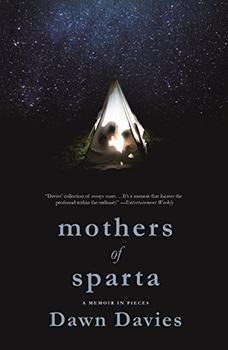Summary | Excerpt | Reviews | Beyond the Book | Readalikes | Genres & Themes | Author Bio

A Memoir in Pieces
by Dawn DaviesNIGHT SWIM
It is a moonless night, dark and rare, and the heat is oppressive, the kind of heat where a deep breath leaves you unsatisfied, suspicious that there was nothing life-giving at all in what you've inhaled, and you are left air-hungry, wet at the pits, forehead greasy with sweat, wishing for the night to be over, for your daughters to exhaust their energy, to cool their dense, hot centers enough to sleep for one more night in this summer that seems to stretch into your future like a planetary ring full of debris, circling forever around something it can't escape. It is thickly hot and you hate it.
You sit beside the pool in a plastic chair, dipping the soles of your feet in the water that is the temperature of spit, fanning your face with your own damp hand, which doesn't help. Back in the yard, your corked-up dog cannot contain his glee and shrieks several times into the sky, warding off something no one can see, and your daughters burst like rays from the cool of the house, drop their towels on the deck, and leap to cannonball into the pool, one like the other, although you can discern subtleties in their silhouettes, how the one crooks her elbow a certain way, how the other curves her back like so, how their hair billows from their heads in differently weighted undulations.
They whoop and cry out into the night, like whistling rockets, arms flailing until they disappear underwater, the force of the waves spreading to the walls of the pool and back.
The water swells over the edge of the brick coping and spreads darkly at your bare feet like a shadow. A bloom of chlorine hits your nose before your daughters erupt to the surface, shouting, shiny diamonds of light reflecting off the lace of wet on their brown arms and necks and faces. They glow, not like reflections of suns and stars, but like stars themselves. The light coming off them is their own.
"My God," you say, without meaning to. They turn and you are startled to see a dusking of their future faces, their grown-up faces, faces that will be shaped by struggle and pain and loss, expressions that will take up residence once they taste the dirt that life feeds them, the profiles that will be theirs once they have given birth. Changed faces. Grown faces, soft, umbral curves replaced by shadows and lines and angles. You lock eyes briefly and they are gone, ignis fatuus, and your little girls are there again.
"Jesus, Mary, and Joseph," you blurt out.
"What?" they say.
"Nothing," you say. "Don't move." And you step inside to get the camera. You can't control any of this, but you will try to capture it, this light, this heat of them, their dual stars Castor and Pollux disappearing, shape-shifting again until they are babies in your arms, then they are women, then they are children enjoying a night swim. You begin taking photographs in the dark.
One of them pushes up out of the pool, the weight of the water pulling her curls down her back in shy, reluctant tendrils as she plucks the bathing suit elastic out of her butt crack and walks away without looking back at you, her tiny scapulae protruding like wings before she turns and smiles, but the smile is not for you, it is nothing but a by-product of her joy, the untethered joy she is still young enough to feel, the joy that comes from leaping off the edge of something into another thing that will catch her, soften the blow, cool her body, temper the flame of youth and the disconnect with future things.
And she sprints and leaps into the sky, untethers from the force field that holds her to you, and she is twenty-one, flying a midnight plane to France to meet her French boyfriend, a man you have not yet met, and she no longer feels the need to call you and tell you where she will be and what time she will be home, because her home is no longer your home and she has entered another orbit. For the rest of your days you won't know exactly where she is on the map, and you won't know what she is thinking, and her shattering smile, and the fake disdain and subtle wrinkling of her nose will be for someone else, and you can only hope you taught her well.
Excerpted from Mothers of Sparta by Dawn Davies. Copyright © 2018 by Dawn Davies. Excerpted by permission of Flatiron Books. All rights reserved. No part of this excerpt may be reproduced or reprinted without permission in writing from the publisher.




Dictators ride to and fro on tigers from which they dare not dismount. And the tigers are getting hungry.
Click Here to find out who said this, as well as discovering other famous literary quotes!
Your guide toexceptional books
BookBrowse seeks out and recommends the best in contemporary fiction and nonfiction—books that not only engage and entertain but also deepen our understanding of ourselves and the world around us.